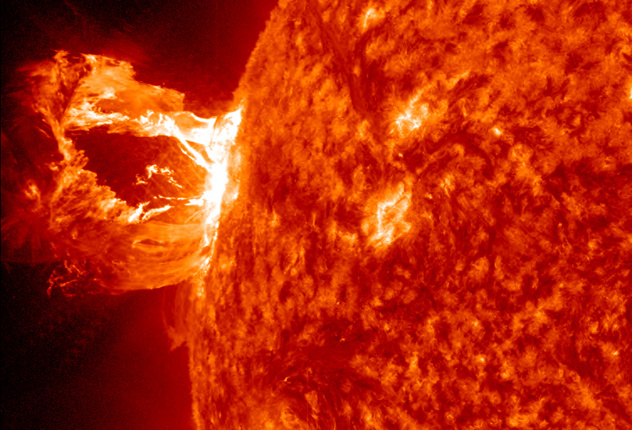Now that summer is starting and hot days are ahead, here are ten interesting facts about temperature from listverse.com:
"Temperature is one of the fundamental measurements in physics, and it’s absolutely crucial to all kinds of life. But at ultra-high and ultra-low temperatures, things can get very weird—as you’ll see. Here’s a list of ten interesting facts about this important factor in our world:
The Hottest Man-Made Temperature
The hottest man-made temperature ever recorded is 7.2 trillion degrees fahrenheit, or about four billion degrees celsius. Since we hope to minimize the use of superlatives in this list, let’s just say: that’s pretty hot. In fact, it’s about 250,000 times hotter than the temperature at the core of the sun. The extreme recording was made at the Brookhaven Natural Laboratory in New York, in their 2.4-mile-long Relativistic Heavy Ion Collider. Scientists had been smashing gold ions together, in an attempt to recreate big-bang like conditions by creating a quark-gluon plasma. In this plasma state, the particles that make up the nucleus of atoms—protons and neutrons—break apart, and create a “soup” of their constituent quarks.
Light Does Awesome Things When Cooled
We’ve already made mention of the Bose-Einstein condensate. It’s a phenomenon that occurs to matter at a fraction of a degree above absolute zero. Though previously seen only at these super-cold temperatures, scientists were able to recreate the effect at room temperature, by using light instead of matter. They managed to do this because of the relative density of the matter and the light; one of the scientists involved, Jan Klars, explained that “ Our photon gas has a billion times higher density, and we can achieve the condensation already at room temperature.” They forced light to travel through two mirrors with particles of dye between them. As the light bounced back and forth, it lost a little bit of energy each time it passed through some dye. And when it reached room temperature, the light effectively began to behave like an ultra-cold gas made of traditional matter. This result takes on a whole new relevance when we learn that it could lead to new types of lasers—which, after all, should be the ultimate goal of all physics research.
Extreme Temperatures of The Solar System:
Some of you may be familiar already with the following comparisons—but take a moment to think about what they really mean, in relation to the normal temperatures of human experience.
The sun—to borrow an understatement from an earlier entry—is pretty hot. It’s at its hottest in the centre, which reaches around twenty-seven million Fahrenheit (fifteen million Kelvin). In comparison, it’s actually less than ten thousand degrees Fahrenheit at its surface (about 5,700 K).The center of the Earth stands at about the same temperature as the surface of the sun. Apart from the sun’s center, the hottest part of our solar system is the core of Jupiter, which, remarkably, is five times hotter than the Sun’s surface.
And the coldest-known place? That’s actually on our own moon, where temperatures in the shadows of some craters are only thirty Kelvin above absolute zero. The temperatures, measured by NASA’s Lunar Reconnaissance Orbiter, are even colder than those on Pluto.
Triple Points:
The SI unit of temperature is the Kelvin. The temperatures used to define this are absolute zero—the bottom limit of temperature—and what known as the triple point of water. A triple point is defined as the temperature by which a substance’s traditional three states of matter exist in an equilibrium. At this point, the most infinitesimally small alteration to temperature or pressure can be used to alter its state one way or another.
To define one Kelvin, you take the difference in temperature between the triple point of water and absolute zero and divide it by 273.16. There are limited practical applications of the triple point of water, but its proximity to the melting point is key to causing the watery cushion needed to allow people to ice-skate.
Scientists Neglected It:
The rules of nature that govern temperature are known as the Laws of Thermodynamics. Originally there was only a first, a second, and a third law—but then scientists came up with a fourth law. The newest law stated that “if two systems are each in thermal equilibrium with a third system, they are also in thermal equilibrium with each other.”
That basically means that if two objects don’t have a net exchange of heat with a third object, they’d not do so with each other—which is how we define them as being at the same temperature.
Scientists soon realized that this law is fundamental to the whole field of thermodynamics; they also realized that it should have been the first rule they formulated. Because “first law” was already taken, they gave it due respect by calling it the “zeroth law.”. It was around 1935 when the law was coined—meaning that scientists didn’t get around to formally defining what temperature meant until a couple of hundred years into the development of the field.
Extreme Temperatures of Human Habitation:
Some people have established their homes in the most unlikely of places. The coldest permanently inhabited places in the world are the towns of Oymyakon and Verkhoyansk in Siberia, which we’ve mentioned before. During winter, temperatures there average below minus fifty degrees Fahrenheit.
The coldest city in the world is also in Siberia. Yakutsk, with a population of 270,000, is not much warmer in the winter than its smaller cousins—often dropping below minus forty degrees Fahrenheit. But at the height of summer, temperatures can swing all the way up to the other end of the scale, to almost ninety degrees Fahrenheit.
The highest recorded average temperature belongs to the abandoned town of Dallol, in Ethiopia, which recorded an average temperature of ninety-six degrees in the 1960s. The record for hottest city is Bangkok, with average air temperatures breaking above ninety-three degrees between March and May.
But the record for hottest workplace likely goes to Mponeng gold mine, in South Africa. At two miles below the surface, rock temperatures can reach 150 degrees Fahrenheit. Ice must be pumped into the mine—and the walls insulated with concrete—to allow people to work there without perishing.
Coldest Man-Made Temperature:
Making things cold has produced a lot of interesting and important results in science. Humans make the coldest known things in the universe, many orders of magnitude colder than anything that occurs naturally. Refrigeration allows temperatures of a few milli Kelvin to be accomplished. The coldest temperature ever achieved is slightly below one hundred pico Kelvins, or 0.0000000001 K. It’s necessary to use a type of magnetic cooling to achieve temperatures this low. Similar temperatures can be achieved on a small scale using lasers.
At these temperatures, matter behaves differently to the way it does normally (see Bose-Einstein condensate above as an example)—a fact which is key to revealing the many odd quirks of quantum mechanics.
The Universe Is Getting Colder:
If you were to take a thermometer out into deep space and leave it there, far from any source of radiation, it would read 2.73 Kelvin—a little lower than minus 454 degrees Fahrenheit. That happens to be the coldest naturally-occurring temperature in the universe.
Space is kept above absolute zero by background radiation left over from the Big Bang. Although space is nevertheless very cold, it’s interesting to note that one of the biggest problems encountered by astronauts is actually heat. Bare metal on orbiting objects can reach five hundred degrees Fahrenheit (260 C) due to the unimpeded heat of the sun, and needs to be covered in special coatings to lower the touch temperature to “only” 250 Fahrenheit (120 C).Outer space itself, however, is constantly getting cooler. Theory has long predicted this, and recent measurements have confirmed that the universe is cooling by around one degree every three billion years.
It’ll continue heading towards absolute zero, though it will never quite reach it (an impossible feat). The background heat of the universe makes little difference to us; the effect of celestial bodies in our solar system and galaxy dwarf it. So it’s not going to counteract global warming, in case anyone has ideas.
Caloric Theory:
Heat is a mechanical property of matter. Put simply: the hotter a thing is, the more energy its particles have as they move around. The atoms in a red-hot solid are vibrating more quickly than the atoms in a cold piece of material. Likewise, those in a liquid or gas whizz about with a speed which depends on how hot they are. That’s pretty basic stuff, which you probably learned in high school—but for hundreds of years until the late nineteenth century, scientists believed that heat itself was actually a substance. This is known as the caloric theory.
The gas of “heat”, scientists believed, would evaporate from a hot substance, thereby cooling it. It would flow from a hot object into a cooler one. Many of the predictions arising from caloric theory actually hold true, and a lot of scientific progress was possible in spite of this fundamental misunderstanding. Caloric theory even had proponents up until the late nineteenth century, at which point the mechanical theory of heat was established beyond dispute.
The Planck Temperature:
This list has made many mentions of absolute zero. We’ve even mentioned it on Listverse before. But what about the other end of the scale? How hot can things get? The short answer is that we don’t know for certain; and it’s a question at the forefront of modern fundamental physics.
The hottest temperature commonly mentioned in science is known as the Planck Temperature. It’s the hottest temperature believed to have occurred in the universe, a mere fraction of a moment after the Big Bang. It’s about 10^32 Kelvin. To give you some perspective, that’s about ten billion billion billion times hotter than the temperature mentioned earlier, which was itself 250,000 times hotter than the core of the sun. And you thought your bath water was hot. The Planck Temperature is the highest temperature possible, according to the Standard Model. Any hotter, and conventional laws of physics begin to break down.
It’s possible that temperature might continue to increase even after this point; and we simply don’t know what would happen if it did so. Anything hotter than that is basically too hot to exist in our current model of reality."
Reference: https://listverse.com/2013/05/17/10-interesting-facts-about-temperature/
I have lost a lot of faith with the Medical Community and the Governments over the last several years, but there are a few good things that can raise above the corruption and the pushing of drugs a new approach to heal people. The following is from www.gaia.com and written by Hunter Parsons that does not involve any drug or pushing an ineffective so called vaccine that the drug company is not held accountable in any way but they use sound! The use of sound can regrow bone tissue! Here is the story:
"The future of regenerative medicine could be found within sound healing by regrowing bone cells with sound waves.
The use of sound as a healing modality has an ancient tradition all over the world. The ancient Greeks used sound to cure mental disorders; Australian Aborigines reportedly use the didgeridoo to heal; and Tibetan or Himalayan singing bowls were, and still are, used for spiritual healing ceremonies.
Recently, a study showed an hour-long sound bowl meditation reduced anger, fatigue, anxiety, and ...
Not a fan of a Defense Agency studying Anti-Gravity and other Exotic Tech, but if the commercial world and make this technology cheap that will change our world yet again. The following is about three minute read and from www.gaia.com. The below was written by Hunter Parsons:
"Wormholes, invisibility cloaks, and anti-gravity — it’s not science fiction, it’s just some of the exotic things the U.S. government has been researching.
A massive document dump by the Defense Intelligence Agency shows some of the wild research projects the United States government was, at least, funding through the Advanced Aerospace Threat Identification Program known as AATIP.
And another lesser-known entity called the Advanced Aerospace Weapons System Application Program or AAWSAP
The Defense Intelligence Agency has recently released a large number of documents to different news outlets and individuals who have filed Freedom of Information Act requests.
Of particular interest are some 1,600 pages released to Vice News, which ...
As our technology gets better we are discovering more about the history of mankind and pushing the timeline back further and further. The following article is from www.gaia.com and written by Michael Chary that discusses this new find that changes the historical timeline:
"Over the past decade, there have been a number of archeological revelations pushing back the timeline of human evolution and our ancient ancestors’ various diasporas. Initially, these discoveries elicit some resistance as archeologists bemoan the daunting prospect of rewriting the history books, though once enough evidence is presented to established institutions, a new chronology becomes accepted.
But this really only pertains to the era of human development that predates civilization — the epochs of our past in which we were merely hunter-gatherers and nomads roaming the savannahs. Try challenging the consensus timeline of human civilization and it’s likely you’ll be met with derision and rigidity.
Conversely, someone of an alternative...
Not sure if you have heard of a show on YouTube called "The Why Files". If not you should check it out it is interesting and has some humor with it on different subjects. Last weeks was on a different theory how the Universe works and how main stream Science is attempting to shut it down like is always seems to do if it goes aguest some special interest. Today it is akin to what happened to those who questioned the Earth was the Center of the Universe that main stream so called Science all believed during the Renaissance period, They called any theory that the Earth was not the Center of the Universe misinformation. Does this sound familiar today? People laughed and mocked people like Leonardo da Vinci, Nicolaus Copernicus, Georg Purbach as crack-pots, conspiracy theorists, nut-jobs and they were suppressed and even imprisoned for their radical thoughts and observations. Again it sounds like today in so many ways. In any event this is a good one to ponder and see even if a bad idea ...
Seemingly chaotic systems like the weather and the financial markets are governed by the laws of chaos theory.
We all have heard about chaos theory, but if you have not or have forgotten what chaos theory is well here you go from interestingengineering.com:
"Chaos theory deals with dynamic systems, which are highly sensitive to initial conditions, making it almost impossible to track the resulting unpredictable behavior. Chaos theory seeks to find patterns in systems that appear random, such as weather, fluid turbulence, and the stock market.
Since the smallest of changes can lead to vastly different outcomes, the long-term behavior of chaotic systems is difficult to predict despite their inherently deterministic nature.
As Edward Lorenz, who first proposed what became commonly known as the Butterfly Effect, eloquently said, "Chaos: When the present determines the future, but the approximate present does not approximately determine the future.""
You may have heard the term about chaos theory as a butterfly flaps its wings in Brazil,...
I for one have lost trust in Medical Doctors due to COVID and reflection that they seem to push pills for everything and untested so called vaccines that is using a unproven technology because the Government and the Medical Boards of the State told them to. There are a very few exceptions. Thus they do not address the key problem just prescribe more and more pills to keep you alive an sick longer for them and Big Phama to profit from you. Will AI do any better? Well that depends on what was used for the training of AI. If it also pushes pills and vaccines without question then you have the same problems noted above. However, if the AI Training includes all possible forms of treatment and they zero in on the right issues for the true problem then there is possibilities they would be way better than most of the current Medical Doctors today.
The following is from an article from interestingengineering.com and written by Paul Ratner:
"A new study looks at how accurately AI can diagnose patients. We interview the researcher, who weighs in on AI's role ...






























